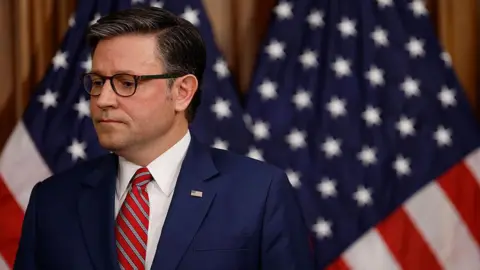 Getty Images
Getty ImagesThe budget, which would end the longest shutdown in U.S. history, heads to the House floor for a vote on Wednesday.
On the 42nd day of the impasse, representatives return to Washington to decide whether to approve a Senate package that would fund federal agencies for two months.
Republican leadership has expressed confidence that the spending plan will be approved by the lower house of Congress, despite their slim majority. But leading Democrats have vowed to oppose it.
President Donald Trump has indicated he will sign the legislation. “We are opening up our country,” he said Tuesday at a Veterans Day event in Arlington, Virginia. “It should never have been closed.”
The shutdown, which began Oct. 1, has left a million federal workers without pay, stopped food stamps for low-income Americans and delayed air travel for passengers ahead of Thanksgiving.
With about 1,200 flights canceled Tuesday because unpaid air traffic controllers called in sick amid a funding impasse, lawmakers are looking for other ways to get to Washington.
Congressman Rick Crawford of Arkansas wrote on X that he was driving with fellow Republican Trent Kelly of Mississippi to the nation's capital.
Congressman Derrick Van Orden said he was riding a Harley Davidson motorcycle from his home state of Wisconsin.
“It’s going to be a little chilly,” he wrote on X about the 16-hour trip. “But I will do my duty.”
The House Rules Committee advanced the bill on a procedural party-line vote of 8 to 4 early Wednesday, ending a seven-hour session.
Republicans on the panel rejected Democratic amendments aimed at extending expiring health insurance subsidies, their main demand during the impasse.
The House is expected to reconvene at 4 pm EST (2100 GMT) for an hour-long debate on the legislation before voting.
Democratic House Minority Leader Hakeem Jeffries of New York has vowed to fight the bill.
“We, as House Democrats, are vehemently opposed to this reckless Republican attempt to continue raising the high cost of living for everyday Americans,” he told CNN.
Jeffries expressed disappointment with Senate Democrats who sided with Republicans Monday night to pass the spending plan.
Democrats' main demand during the shutdown was that Republicans include a provision in the spending bill to expand tax breaks that would make health insurance less expensive for 24 million Americans.
But Republicans remained united and refused to budge, agreeing only to allow a December vote on health care subsidies, something they had proposed weeks ago.
And there is no guarantee the measure will even pass the Senate, while House Speaker Mike Johnson has yet to commit to holding a vote on the tax cuts in that chamber.
Johnson kept the House from meeting for 53 days to pressure Senate Democrats to agree to a shutdown compromise.
Before Wednesday's vote, he will swear in Arizona Congresswoman-elect Adelita Grijalva, the Democrat who won a special election in September.
Once she takes the oath of office, the Republican majority in the House of Representatives will be reduced to five votes, 219-214.
That means Johnson can only afford to lose two Republicans on any party-line vote.
The budget leaves the federal government on course to continue adding about $1.8tn (£1.4tn) a year to its $38tn debt.
But Chip Roy of Texas said he was “not aware of any significant opposition” to the bill from fiscal hawks in his House Freedom Caucus.
Potential Republican defectors Thomas Massie of Kentucky or Victoria Spartz of Indiana have so far remained tight-lipped about how they plan to vote.
But even if they do fail, the House speaker could still push the bill across the line with the help of moderate Democrats like Jared Golden of Maine or Henry Cuellar of Texas.
Neither party appears to have emerged politically unscathed from this legislative imbroglio.
Opinion polls show voters believe Republicans bear slightly more blame, while Democrats are sharply divided over brinksmanship.
And once the quarantine ends, appropriators will only have two months to prevent another one.
Government funding will next expire on January 30th.

Follow the twists and turns of Trump's second term with North America correspondent Anthony Zurcher's Weekly. US policy is not promoted newsletter. Readers in the UK can register here. Those outside the UK can register here.








